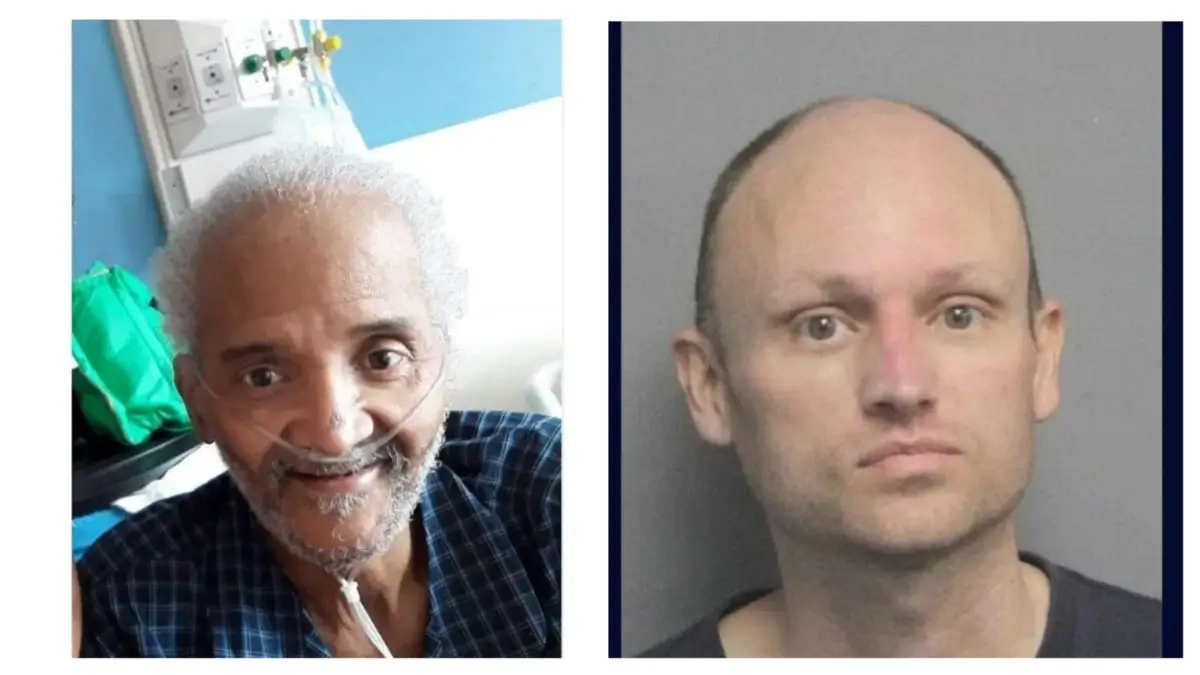‘You Were The Only Demon That Day’: Louisiana Man Claimed Insanity After Stabbing Black Grandfather 16 Times But Jury Didn’t Buy It, Sentenced Him to Life In Less Than 30 Minutes
A suburban New Orleans man who ambushed his neighbor and stabbed him at least 16 times feigned mental illness in the hopes of raising an insanity defense, saying he was a “son of God” and needed to kill “a demon.”
Jerry Gelpi, 42, was convicted of murder on Oct. 9 after his ruse fell apart in the face of overwhelming evidence.
“Mr. Gelpi, you’re going where you deserve to be,” 24th Judicial District Court Judge Frank Brindisi told him while handing down a life sentence for first-degree murder without parole. “You accused this man of being a demon. You were the only demon that day.”
Gelpi, who authorities say had a history of brandishing knives and faking mental illness, was also fined $100,000.
Charles Davis (left) was fatally stabbed his neighbor Jerry Gelpi (right). Credit: Family Photo/Jefferson Parish Sheriff’s Office)
On Feb. 8, 2021, Charles Davis was recovering from a severe bout with COVID-19 and was in a weakened state, having lost 75 pounds after three months in the hospital, when Gelpi entered his Jefferson, Louisiana apartment, with a knife.
The 68-year-old was attacked at the entrance to his bathroom, and though there were signs of a struggle — the bathroom sink was knocked off the wall — the grandfather of five succumbed to his injuries, which included defensive stab wounds on his hands and multiple stab wounds to his head and neck.
When texts went unanswered, his concerned daughter checked on him the next morning and made a horrifying discovery: she found his body curled in a fetal position in the bathtub, and his wallet was missing.
Gelpi, who lived in the same apartment building, initially denied any involvement in the murder, claiming he had never stepped foot inside Davis’ home, the Jefferson Parish Sheriff’s Office said in an official statement. But that story quickly unraveled when surveillance video linked him to the apartment.
Now scrambling, he concocted a story that Davis, who needed auxiliary oxygen to breathe, was a big partier and a heavy drinker. Neighbors countered his claims, saying Davis was quiet and didn’t have many visitors, reported The New Orleans Advocate.
Gelpi then took a different tack, saying a local homeless man committed the murder. Investigators, however, uncovered a mountain of evidence pointing directly to Gelpi.
After looking into his background, detectives discovered he had a troubling history with knives, dating back to 2013 when he was caught shoplifting and threatened the officer who detained him. He was also arrested for attempting to stab two men at a Walmart in 2020 after an argument. But they still needed a stronger case to obtain a search warrant.
The DNA evidence was their smoking gun. DNA found under Davis’s fingernails and on the kitchen faucet came back a match for Gelpi.
Police found a trail of blood leading to the kitchen and believe that’s where Gelpi tried to wash the blood off his hands and the knife, which he later tossed in the Mississippi River.
A search of his apartment turned up five tactical knives along with a damning history on his computer browser, showing he had researched knife fighting and how to stab people in their vital organs, prosecutors said.
Unbelievably, when police arrived at the apartment building to arrest Gelpi, he rode up on his bike carrying a knife.
With no way to deny his involvement, Gelpi pivoted to a defense of not guilty by way of insanity. At trial, he testified that he couldn’t control himself and was driven to kill because Davis was “the strongest demon in my experience,” prosecutors said.
“He pointed to detectives seated in the courtroom and said they were demons,” according to the prosecutors.
Insanity is incredibly difficult to prove, which is why less than 1 percent of defendants in criminal cases choose this plea, and of those, only 26 percent are successful.
Despite such low odds, it turns out that Gelpi had tried this before. He faked a mental illness so he could be discharged from the Navy in 2004, according to prosecutors, and bragged to an acquaintance that he lied to a judge about a substance abuse problem to receive leniency in a robbery case.
The jury returned a verdict within 24 minutes. They found him guilty of murder in the first degree and guilty of obstruction of justice for eliminating evidence. The defense tried to overturn the verdict and ask for a new trial, but the judge rejected the motions.
Four of Davis’s family members shared victim-impact statements during the sentencing, including his daughter, who spoke of her anguish over not being able to celebrate her upcoming birthday with her father.
“Knowing that I can never get that phone call again is heartbreaking,” she testified, according to prosecutors.
Davis’s sister told the court, “I will never get a chance to hug him to speak with him to tell him how much I love him … or just to hear him say, ‘Sis, you alright?’”

